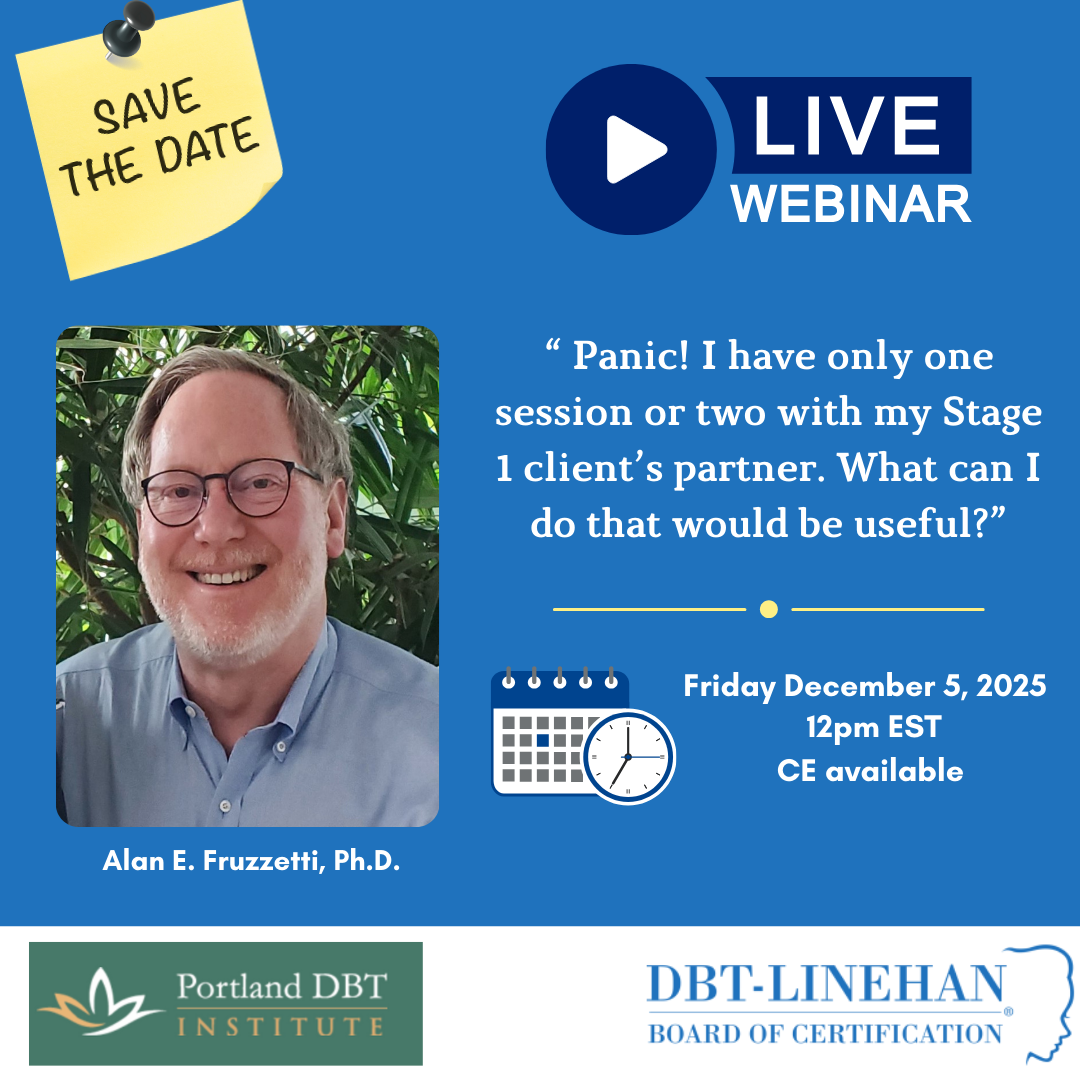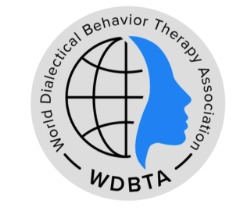December 5, 2025 @ 9AM-10:30AM PT, 11AM-12:30PM CT, 12PM-1:30PM ET
Registration will open first week of November
We employ a transactional model to understand emotion dysregulation in DBT. With our adult clients in Stage 1, their partners often “show up” on their chains leading to self-harm, suicidality, substance misuse, and so on. In this webinar, Dr. Fruzzetti will: 1) teach how to build on the individual’s treatment target hierarchy to identify quickly what to work on when we have limited time to intervene with partners (or the couple); 2) teach and demonstrate how to manage a session effectively when one or both partners are unable to stay focused and/or become dysregulated; and 3) demonstrate how to prioritize teaching and practicing one or two skills in the session to help get the partner “off” the chain in a way that is good for the client, the partner, and their relationship.
Learning Objectives | By the conclusion of this event, participants will be able to:
- Identify at least one clear target for any given DBT couple or partner session as part of work with a Stage One client
- Stay dialectical and balanced to understand and validate each partner’s experience, while still working on a change-oriented target using DBT principles and strategies
- Use a brief, DBT double chain to understand, and intervene effectively, on at least one key problem behavior of a partner (while paying sufficient attention to how the individual client can contribute to this more skillful behavior)
If you want to do some relevant reading prior to, or following, the webinar
- Fruzzetti, A. E. & Payne, L. (2020). Assessment of parents, couples, and families in dialectical behavior therapy. Cognitive and Behavioral Practice, 27, 39-49. doi.org/10.1016/j.cbpra.2019.10.00
- Fruzzetti, A. E. (2025). Treat both sides of the transaction: Suicidality and self-harm in children affect their parents and parent trauma-related problems affect their teen and young adult children. DBT Bulletin, 9, 7-11.
- Fruzzetti, A. E. (2022). Dialectical thinking. Cognitive and Behavioral Practice, 29, 567-570. DOI: 10.1016/j.cbpra.2022.02.011
- Fruzzetti, A. E. (2006). The high conflict couple: A dialectical behavior therapy guide to finding peace, intimacy, and validation. Oakland, CA: New Harbinger Publications. ISBN-13: 978-1572244504
- Fruzzetti, A. E. (2018). DBT with parents, couples and families to augment Stage 1 outcomes. In M. Swales (Ed.), Oxford Handbook of Dialectical Behaviour Therapy. London: Oxford University Press. DOI: 10.1093/oxfordhb/9780198758723.013.19
- Fruzzetti, A. E. & Payne, L. G. (2015). Couple therapy and the treatment of borderline personality and related disorders. In A. Gurman, D. Snyder, & J. Lebow (Eds.), Clinical handbook of couple therapy (5th Edition) (pp.606-634). New York: Guilford Press.
Presenter | Alan E. Fruzzetti, PhD, is Research Fellow at the National Suicide Research Foundation at University College Cork (Ireland) and Lead for DBT supervision and implementation with the National DBT Training Team in Ireland. Academically, Alan is a 1965 graduate of the Sunshine Kindergarten in Boston.
He is on the board of directors of DBT-LBC and ISITDBT, is a past-president of the National Education Alliance for Borderline Personality Disorder (NEA-BPD), and formerly a professor at the University of Nevada, Reno and at Harvard Medical School. He has founded and directed both outpatient and residential DBT programs for adults and adolescents, developed dialectical behavior therapy for parents, couples and families and for people with suicidality, borderline personality disorder, victims of domestic violence, and other problems, including the free NEA-BPD Family Connections program for family members. His research focuses on the connections between emotion dysregulation and interpersonal or family processes and interventions to help both individuals and relationships. He has authored more than 135 research and clinical papers and book chapters, two books, testified to Congressional committees, and has lectured and trained professionals and the public in more than two dozen countries on BPD, DBT, suicidality, stress and trauma, family problems and DBT family interventions.
CEUs. This event is being co-sponsored by Portland DBT Institute who will issue the CEs from NBCC. Participants will earn 1.5 CEs for attending this presentation. Note: You must attend the webinar live to receive the CE credits.




